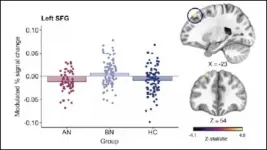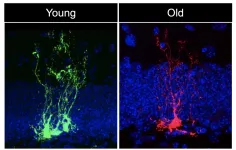(Press-News.org) Spanking may affect a child's brain development in similar ways to more severe forms of violence, according to a new study led by Harvard researchers.
The research, published recently in the journal Child Development, builds on existing studies that show heightened activity in certain regions of the brains of children who experience abuse in response to threat cues.
The group found that children who had been spanked had a greater neural response in multiple regions of the prefrontal cortex (PFC), including in regions that are part of the salience network. These areas of the brain respond to cues in the environment that tend to be consequential, such as a threat, and may affect decision-making and processing of situations.
"We know that children whose families use corporal punishment are more likely to develop anxiety, depression, behavior problems, and other mental health problems, but many people don't think about spanking as a form of violence," said Katie A. McLaughlin, John L. Loeb Associate Professor of the Social Sciences, director of the Stress & Development Lab in the Department of Psychology, and the senior researcher on the study. "In this study, we wanted to examine whether there was an impact of spanking at a neurobiological level, in terms of how the brain is developing."
According to the study's authors, corporal punishment has been linked to the development of mental health issues, anxiety, depression, behavioral problems, and substance use disorders. And recent studies show that approximately half of parents in U.S. studies reported spanking their children in the past year and one-third in the past week. However, the relationship between spanking and brain activity has not previously been studied.
McLaughlin and her colleagues--including Jorge Cuartas, first author of the study and a doctoral candidate in the Harvard Graduate School of Education, and David Weissman, a post-doctoral fellow in the Department of Psychology's Stress & Development Lab--analyzed data from a large study of children between the ages of three and 11. They focused on 147 children around ages 10 and 11 who had been spanked, excluding children who had also experienced more severe forms of violence.
Each child lay in an MRI machine and watched a computer screen on which were displayed different images of actors making "fearful" and "neutral" faces. A scanner captured the child's brain activity in response to each kind of face, and those images were analyzed to determine whether the faces sparked different patterns of brain activity in children who were spanked compared to those who were not.
"On average, across the entire sample, fearful faces elicited greater activation than neutral faces in many regions throughout the brain... and children who were spanked demonstrated greater activation in multiple regions of PFC to fearful relative to neutral faces than children who were never spanked," researchers wrote.
By contrast, "(t)here were no regions of the brain where activation to fearful relative to neutral faces differed between children who were abused and children who were spanked."
The findings are in line with similar research conducted on children who had experienced severe violence, suggesting that "while we might not conceptualize corporal punishment to be a form of violence, in terms of how a child's brain responds, it's not all that different than abuse," said McLaughlin. "It's more a difference of degree than of type."
Researchers said the study is a first step towards further interdisciplinary analysis of spanking's potential effects on children's brain development and lived experiences.
"These findings aligned with the predictions from other perspectives on the potential consequences of corporal punishment," studied in fields such as developmental psychology and social work, said Cuartas. "By identifying certain neural pathways that explain the consequences of corporal punishment in the brain, we can further suggest that this kind of punishment might be detrimental to children and we have more avenues to explore it."
However, they noted that their findings are not applicable to the individual life of each child.
"It's important to consider that corporal punishment does not impact every child the same way, and children can be resilient if exposed to potential adversities," said Cuartas. "But the important message is that corporal punishment is a risk that can increase potential problems for children's development, and following a precautionary principle, parents and policymakers should work toward trying to reduce its prevalence."
Ultimately, added McLaughlin, "we're hopeful that this finding may encourage families not to use this strategy, and that it may open people's eyes to the potential negative consequences of corporal punishment in ways they haven't thought of before."
INFORMATION:
Energy flows through a system of atoms or molecules by a series of processes such as transfers, emissions, or decay. You can visualize some of these details like passing a ball (the energy) to someone else (another particle), except the pass happens quicker than the blink of an eye, so fast that the details about the exchange are not well understood. Imagine the same exchange happening in a busy room, with others bumping into you and generally complicating and slowing the pass. Then, imagine how much faster the exchange would be if everyone stepped back and created a safe bubble for the pass to happen unhindered.
An international collaboration of scientists, including UConn Professor of Physics Nora Berrah and post-doctoral researcher ...
New York, NY - Major depressive disorder is highly prevalent, with one in five people experiencing an episode at some point in their life, and is almost twice as common in women than in men. Antidepressants are usually given as a first-line treatment, including during pregnancy, either to prevent the recurrence of depression, or as acute treatment in newly depressed patients. Antidepressant use during pregnancy is widespread and since antidepressants cross the placenta and the blood-brain barrier, concern exists about potential long-term effects of intrauterine antidepressant exposure in the unborn child.
Using the Danish National Registers to follow more than 42,000 singleton babies born ...
Stress alters brain activity in self-inhibition areas yet doesn't trigger binge-eating, according to new research published in JNeurosci.
People who binge-eat, a hallmark symptom of several eating disorders, can feel out of control and unable to stop, and often binge after stressful events. This led scientists to theorize stress impairs the brain regions responsible for inhibitory control -- the ability to stop what you are about to do or currently doing -- and triggers binge-eating.
Westwater et al. tested this theory by using fMRI to measure the brain activity of women with anorexia, bulimia, or without ...
A unique residential study has concluded that, contrary to perceived wisdom, people with eating disorders do not lose self-control - leading to binge-eating - in response to stress. The findings of the Cambridge-led research are published today in the Journal of Neuroscience.
People who experience bulimia nervosa and a subset of those affected by anorexia nervosa share certain key symptoms, namely recurrent binge-eating and compensatory behaviours, such as vomiting. The two disorders are largely differentiated by body mass index (BMI): adults affected by anorexia nervosa tend to have BMI of less than 18.5 kg/m2. More than 1.6 million people in ...
In a new study published in Cell Stem Cell, a team led by USC Stem Cell scientist Michael Bonaguidi, PhD, demonstrates that neural stem cells - the stem cells of the nervous system - age rapidly.
"There is chronological aging, and there is biological aging, and they are not the same thing," said Bonaguidi, an Assistant Professor of Stem Cell Biology and Regenerative Medicine, Gerontology and Biomedical Engineering at the Keck School of Medicine of USC. "We're interested in the biological aging of neural stem cells, which are particularly vulnerable to the ravages of time. This has implications for the normal cognitive decline that ...
Researchers have used a technique similar to MRI to follow the movement of individual atoms in real time as they cluster together to form two-dimensional materials, which are a single atomic layer thick.
The results, reported in the journal Physical Review Letters, could be used to design new types of materials and quantum technology devices. The researchers, from the University of Cambridge, captured the movement of the atoms at speeds that are eight orders of magnitude too fast for conventional microscopes.
Two-dimensional materials, such as graphene, ...
New research from McMaster University suggests the pandemic has created a paradox where mental health has become both a motivator for and a barrier to physical activity.
People want to be active to improve their mental health but find it difficult to exercise due to stress and anxiety, say the researchers who surveyed more than 1,600 subjects in an effort to understand how and why mental health, physical activity and sedentary behavior have changed throughout the course of the pandemic.
The results are outlined in the journal PLOS ONE.
"Maintaining a regular exercise program is difficult at the best of times and the conditions surrounding the COVID-19 pandemic ...
A new algorithm can predict which genes cause cancer, even if their DNA sequence is not changed. A team of researchers in Berlin combined a wide variety of data, analyzed it with "Artificial Intelligence" and identified numerous cancer genes. This opens up new perspectives for targeted cancer therapy in personalized medicine and for the development of biomarkers.
In cancer, cells get out of control. They proliferate and push their way into tissues, destroying organs and thereby impairing essential vital functions. This unrestricted growth is usually induced by an accumulation of DNA changes in cancer ...
In the earliest stage of life, animals undergo some of their most spectacular physical transformations. Once merely blobs of dividing cells, they begin to rearrange themselves into their more characteristic forms, be they fish, birds or humans. Understanding how cells act together to build tissues has been a fundamental problem in physics and biology.
Now, UC Santa Barbara professor Otger Campàs, who also holds the Mellichamp Chair in Systems Biology and Bioengineering, and Sangwoo Kim, a postdoctoral fellow in professor Campàs lab, have approached this question, with surprising findings.
"When you have many cells physically interacting with each other, how does the system behave collectively? What is the physical state of the ensemble?" said ...
Evidence is growing that health care delivered by teams is superior to services delivered by a single practitioner. Published in the Journal of the American Board of Family Medicine -- University of Minnesota, University of North Carolina, American Board of Family Medicine and the American Academy of Family Physicians researchers compared key elements from the practice of a pharmacist providing comprehensive medication management to the foundational components defined for primary care.
Based on a common health care team framework -- the Four C's of Primary Care (first contact, continuity, comprehensiveness, and coordination) -- this team ...



